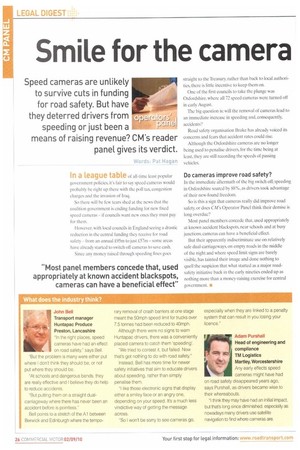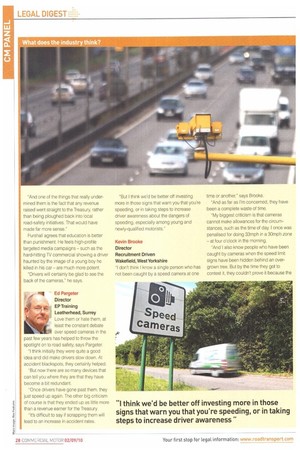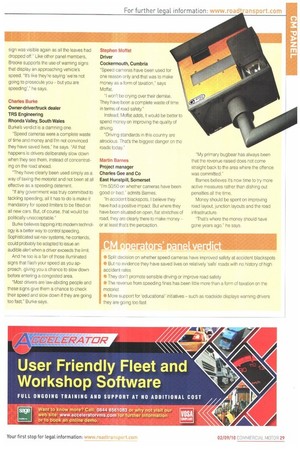What does the indus '
Page 26

Page 28

Page 29

If you've noticed an error in this article please click here to report it so we can fix it.
John Bell Transport manager Huntapac Produce Preston, Lancashire "In the right places. speed cameras have had an effect on road safety, says Bell.
But the problem is many were either put where I don't think they should be, or not put where they should be.
'At schools and dangerous bends, they are really effective and I believe they do help to reduce accidents.
"But putting them on a straight dualcarriageway where there has never been an accident before is pointless."
Bell points to a stretch of the Al between Berwick and Edinburgh where the tempo rary removal of crash barriers at one stage meant the 50mph speed limit for trucks over 7.5 tonnes had been reduced to 40mph.
Although there were no signs to warn Huntapac drivers, there was a conveniently placed camera to catch them 'speeding'.
"We tried to contest it, but failed. Now that's got nothing to do with road safety."
Instead, Bell has more time for newer safety initiatives that aim to educate drivers about speeding, rather than simply penalise them.
"I like those electronic signs that display either a smiley face or an angry one, depending on your speed. It's a much less vindictive way of getting the message across.
"So I won't be sorry to see cameras go, especially when they are linked to a penalty system that can result in you losing your licence."
Adam Purshall Head of engineering and compliance TM Logistics Martley, Worcestershire Any early effects speed cameras might have had on road safety disappeared years ago, says Purshall, as drivers became wise to their whereabouts.
"I think they may have had an initial impact, but that's long since diminished, especially as nowadays many drivers use satellite navigation to find where cameras are. And one of the things that really undermined them is the fact that any revenue raised went straight to the Treasury, rather than being ploughed back into local road-safety initiatives. That would have made far more sense."
Purshall agrees that education is better than punishment. 1-le feels high-profile targeted media campaigns such as the hard-hitting TV commercial showing a driver haunted by the image of a young boy he killed in his car are much more potent.
"Drivers will certainly be glad to see the back of the cameras," he says.
Ed Pargeter Director EP Training Leatherhead, Surrey Love them or hate them, at least the constant debate over speed cameras in the past few years has helped to throw the spotlight on to road safety, says Pargeter.
"I think initially they were quite a good idea and did make drivers slow down. At accident blackspots, they certainly helped.
But now there are so many devices that can tell you where they are that they have become a bit redundant.
'Once drivers have gone past them, they just speed up again. The other big criticism of course is that they ended up as little more than a revenue earner for the Treasury.
"It's difficult to say if scrapping them will lead to an increase in accident rates. "But I think we'd be better off investing more in those signs that warn you that you're speeding, or in taking steps to increase driver awareness about the dangers of speeding, especially among young and newly-qualified motorists.'
Kevin Brooke Director Recruitment Driven Wakefield, West Yorkshire "I don't think I know a single person who has not been caught by a speed camera at one time or another," says Brooke.
"And as far as I'm concerned, they have been a complete waste of time.
"My biggest criticism is that cameras cannot make allowances for the circumstances, such as the time of day. I once was penalised for doing 33mph in a 30mph zone at four o'clock in the morning.
'And I also know people who have been caught by cameras when the speed limit signs have been hidden behind an overgrown tree. But by the time they got to contest it, they couldn't prove it because the sign was visible again as all the leaves had dropped off." Like other panel members, Brooke supports the use of warning signs that display an approaching vehicle's speed. "It's like they're saying 'we're not going to prosecute you but you are speeding'," he says.
Charles Burke Owner-driver/truck dealer TRS Engineering Rhonda Valley, South Wales Burke's verdict is a damning one.
"Speed cameras were a complete waste of time and money and I'm not convinced they have saved lives," he says. "All that happens is drivers deliberately slow down when they see them, instead of concentrating on the road ahead.
"They have clearly been used simply as a way of taxing the motorist and not been at all effective as a speeding deterrent.
"If any government was truly committed to tackling speeding, all it has to do is make it mandatory for speed limiters to be fitted on all new cars. But, of course, that would be politically unacceptable."
Burke believes tapping into modern technology is a better way to control speeding. Sophisticated sat-nay systems, he contends, could probably be adapted to issue an audible alert when a driver exceeds the limit.
And he too is a fan of those illuminated signs that flash your speed as you approach. giving you a chance to slow down before entering a congested area.
"Most drivers are law-abiding people and these signs give them a chance to check their speed and slow down if they are going too fast," Burke says. Stephen Moffat Driver
Cockermouth, Cumbria "Speed cameras have been used for one reason only and that was to make money as a form of taxation," says Moffat.
"I won't be crying over their demise. They have been a complete waste of time in terms of road safety."
Instead, Moffat adds, it would be better to spend money on improving the quality of driving.
"Driving standards in this country are atrocious. That's the biggest danger on the roads today."
Martin Barnes Project manager Charles Gee and Co East Hunstpill, Somerset i'rn 50/50 on whether cameras have been good or bad," admits Barnes.
"In accident blackspots, I believe they have had a positive impact. But where they have been situated on open, flat stretches of road, they are clearly there to make money or at least that's the perception. "My primary bugbear has always been that the revenue raised does not come straight back to the area where the offence was committed."
Barnes believes it's now time to try more active measures rather than dishing out penalties all the time.
Money should be spent on improving road layout, junction layouts and the road infrastructure.
"That's where the money should have gone years ago," he says.
























































































































































































































































